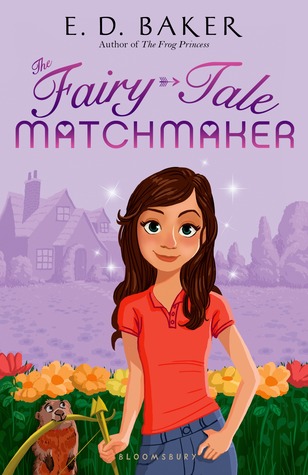 |
| Click to view on Goodreads |
Just as she did with her Wide-Awake Princess series, E. D. Baker spins a tale that is poised to launch her to the top of the fairy tale canon with a new series that fans of Gail Carson Levine and Diana Wynne Jones.
(352 pages)
When I originally saw this coming out, I thought it looked really dumb. I mean, a book about a girl who goes around setting up couples? How dumb would that be? I barely scanned the synopsis before clicking away, and never even gave it a try.
Until a week ago, when I saw it sitting on a library shelf and grabbed it because, well, I might as well because it was there anyway. When I got it home and started reading, I realized that I'd made a mistake: The Fairy-Tale Matchmaker was nothing like what I'd expected to be - and it was much the better for it.
After all, just for starters Cory's world is really fascinating. I read a lot of fairy-tale mashups, but this has to be one of my favorites. I mean, a world where people communicate by basket mail (which is just like texting, but way cooler) and various fairy-tale characters and stereotypes are all mixed together in a magical land that lives next to but is completely separate from the human world.
Another great thing about The Fairy-Tale Matchmaker is that it's realistic (if the word can ever be applied to fairytale mashups) - Cory is an adult trying to find a job that suits her, and she bounces around doing odds and ends in the meantime. There's a beauty in watching the little random things come together in new ways, as by the end of the book Cory's found ways to make almost everyone's life a little bit better by introducing them to other people she's encountered in her wanderings. I like to think that this same sort of falling into place can happen in real life, though I know that's not always the case.
My biggest trouble with the book, honestly, is the ending. Once things get a little darker for Cory and she starts uncovering the hardcore secrets her mother kept from her the book lost some of its appealing rationalism. There's a certain appeal in what happens, though, and I think that it just depends on what sort of mood you're in when you read it. For me it worked, though just barely, and I was interested enough in the turn things took that I immediately went and requested the sequel. I haven't gotten around to reading it yet, but I'll be sure to post a review once I do!
When I originally saw this coming out, I thought it looked really dumb. I mean, a book about a girl who goes around setting up couples? How dumb would that be? I barely scanned the synopsis before clicking away, and never even gave it a try.
Until a week ago, when I saw it sitting on a library shelf and grabbed it because, well, I might as well because it was there anyway. When I got it home and started reading, I realized that I'd made a mistake: The Fairy-Tale Matchmaker was nothing like what I'd expected to be - and it was much the better for it.
After all, just for starters Cory's world is really fascinating. I read a lot of fairy-tale mashups, but this has to be one of my favorites. I mean, a world where people communicate by basket mail (which is just like texting, but way cooler) and various fairy-tale characters and stereotypes are all mixed together in a magical land that lives next to but is completely separate from the human world.
Another great thing about The Fairy-Tale Matchmaker is that it's realistic (if the word can ever be applied to fairytale mashups) - Cory is an adult trying to find a job that suits her, and she bounces around doing odds and ends in the meantime. There's a beauty in watching the little random things come together in new ways, as by the end of the book Cory's found ways to make almost everyone's life a little bit better by introducing them to other people she's encountered in her wanderings. I like to think that this same sort of falling into place can happen in real life, though I know that's not always the case.
My biggest trouble with the book, honestly, is the ending. Once things get a little darker for Cory and she starts uncovering the hardcore secrets her mother kept from her the book lost some of its appealing rationalism. There's a certain appeal in what happens, though, and I think that it just depends on what sort of mood you're in when you read it. For me it worked, though just barely, and I was interested enough in the turn things took that I immediately went and requested the sequel. I haven't gotten around to reading it yet, but I'll be sure to post a review once I do!
No comments:
Post a Comment
Join the conversation!